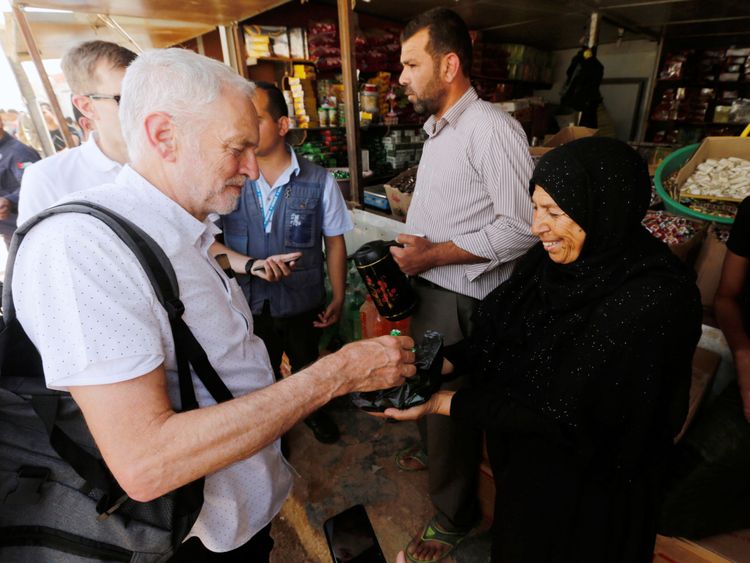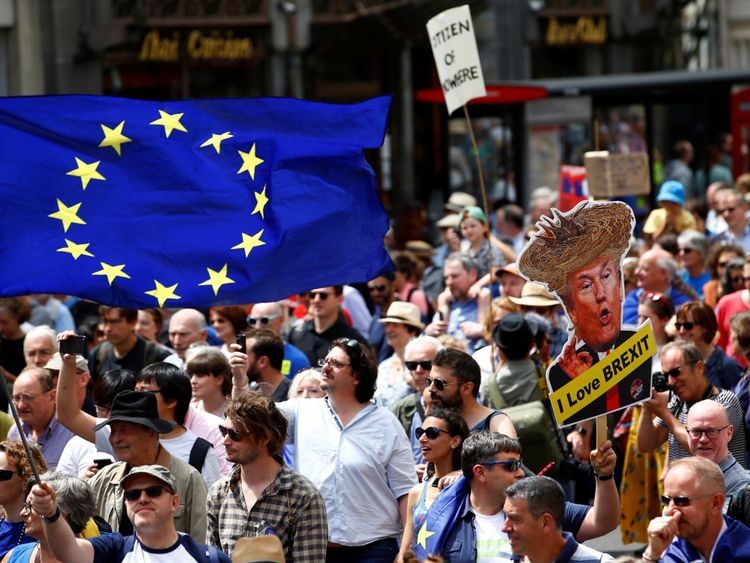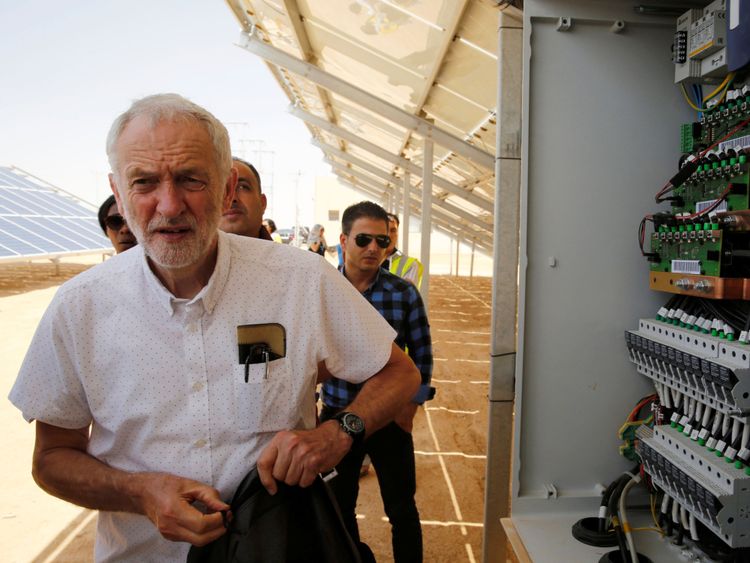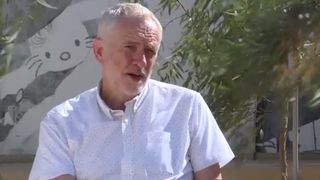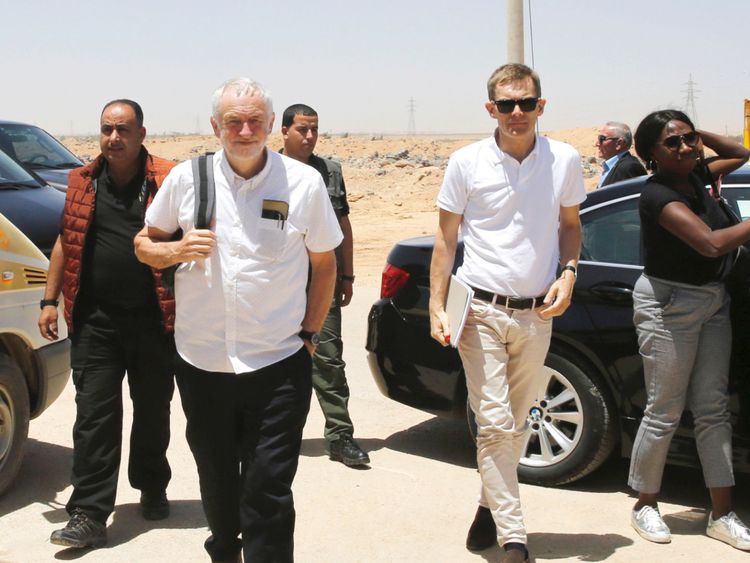[ad_1]
The rhythm was the same. The tune was the same.
But the sound of the now familiar riff from the White Stripes’ anthem Seven Nation Army, so familiar and now indelibly (and incredibly) forever-linked to the leader of the Labour party, for once, was not welcome.
It had mutated. “Where’s Jeremy Corbyn?”, the crowd now impishly cried at the London march calling for a vote on the final Brexit deal.
Answer came there none, because he couldn’t hear them.
As loud as it might’ve been, ringing across the streets of Whitehall and Westminster, you couldn’t hear it in Amman, through its thick dusty air, where Mr Corbyn in fact was, thousands of miles away.
Of the past three days, Mr Corbyn spent them, not marching in London’s streets, but instead meeting Jordanian leaders, including the country’s deputy prime minister.
The rest of the time he spent in two refugee camps, including Zaatari, only 15 miles or so from the Syrian border, home of some 80,000 Syrian refugees. Sky News accompanied him.
His excursion to Jordan was his first non-European foreign trip since becoming leader of the Labour party in 2015.
The location was no accident. He chose it to mark World Refugee Day.
Where better to go but Jordan, in which the population has swelled by millions since the start of the Syrian civil war.
The sense of powerlessness in the camps, is palpable.
Though well resourced after billions of dollars of international aid (Zaatari camp, the first visited by Mr Corbyn, even boasts its own solar power plant, selling its excess to the Jordanian national grid), the truth remains that whatever money is pored in, the lives of those there are, at best on hold.
They are dependent on the whims of foreign governments, of foreign politicians and NGOs.
International dignitaries like Mr Corbyn sweep in frequently – at least one a day, one man told me – but little seems to change.
The Labour leader was determined not to be counted among their number. Indeed, though clearly moved by what he saw, he appeared happy, enthused, jollier than I’ve seen him.
Before he became leader, this is the sort of thing he spent his time doing; engaged in detailed work on foreign affairs, beavering away on sometimes recondite but worthy causes, especially in the Middle East.
It was this sort of thing which got him out of bed in the morning.
These days he doesn’t have much time for such matters but his passion remains undimmed.
Moreover, he brought more than warm words – he came with concrete policies to make things better, calling for a re-engagement of the British government to help solve the Syrian conflict and, more surprisingly, he told me that if he were prime minister he would make Britain part of an EU-wide effort to solve things, including an “in principle” commitment to the introduction of quotas.
What’s more, he said, the UK should be part of that solution irrespective of “what happens with Brexit.”
This won’t have gone unnoticed in Brussels. It was a pledge made on the same weekend where Angela Merkel was attempting to save her government by reaching a cross EU bargain on refugees, held at an emergency EU summit.
Theresa May chose not to attend. For a Labour party conscious it might have to pick up the Brexit pieces and start negotiating at any time, it could yet prove a useful purchase of goodwill.
Domestically though, this was a startling pledge by the Labour leader. It wasn’t so long ago that the idea of a leader of the opposition pledging to take in tens if not hundreds of thousands of refugees would have seemed like political suicide.
But Mr Corbyn’s team believe the calculus of British politics has changed. They think that post-Windrush, there’s been a shift in the public mood-that the public are willing to tolerate a more liberal immigration and refugee policy than hitherto.
They also think that core-Corbyn supporters, the liberal, the young, the cosmopolitan, want that change more than anyone. His suggestions were, therefore, clear, red meat (or perhaps, vegan nut roast) for the Corbyn party faithful.
He matched it with a suggestion that Donald Trump’s visit should be delayed in response to his policy on forced separation of minors.
Mr Trump should accept, the Labour leader argued, that America was a multi cultural society and “get over it.”
Someone, his team reckons, must emerge as the leader of the cosmopolitan, liberal side of the new political divide. It should be Mr Corbyn.
But the dangers of his Jordanian adventure were clear too, on two fronts.
Mr Corbyn’s hyper-liberal base might like his more forceful tone on migrants but how it goes down in the party’s new marginals, the medium sized towns of the midlands and the north and in its similar target seats at the next election, remains to be seen.
Secondly and perhaps most importantly, as much as Mr Corbyn’s base might admire a new position of refugees or knockabout with Donald Trump, most of them care about something far more: Brexit.
As the chants went out at the rally, the journalist Owen Jones tweeted: “Where’s Jeremy Corbyn? He’s at a refugee camp.”
For some this might appear a self-evidently adequate riposte but to many it is only an excuse. Plenty of Labour’s natural supporters don’t trust his motives.
Many view Brexit as an epochal moment which must be resisted at all costs and still suspect that Mr Corbyn is, at heart, a leaver.
Being in Jordan, though important, just doesn’t measure up – at best they think it whimsical, at worse a cultivated excuse to be out of the country. They wanted him there and he wasn’t.
And perhaps some of their fears of his indifference were justified. It was clear to me that the Corbyn team in Jordan weren’t really aware of the rally. One senior Corbyn adviser didn’t even seem to know where it was being held.
Jordan feels a long way away from London but that indifference, with so many Labour voters there, could cost the Labour leader.
If Mr Corbyn comes to be associated with facilitating Brexit, for not fighting the fight as he ought – even if the fight is unwinnable – he might yet find that, at the next election, some of those young, cosmopolitan voters who helped propel him to an unexpectedly good election performance in 2017 just don’t turn out for him next time.
Three Conservative leaders have lost their jobs over the European question. Mrs May could be a fourth.
However virtuous his other deeds, without care, Mr Corbyn might one day find himself as the first Labour leader, to fall on that same jagged, bloody European sword.
[ad_2]
